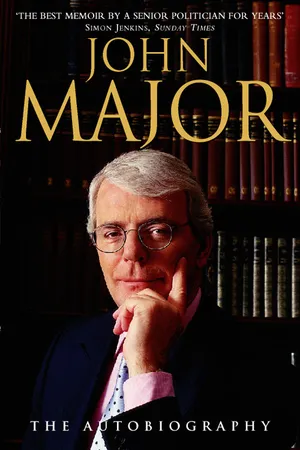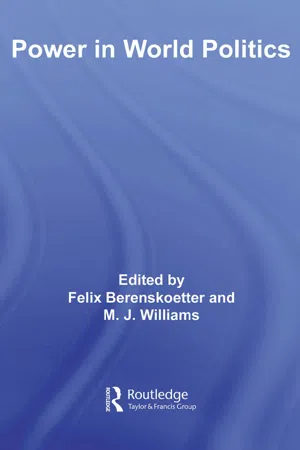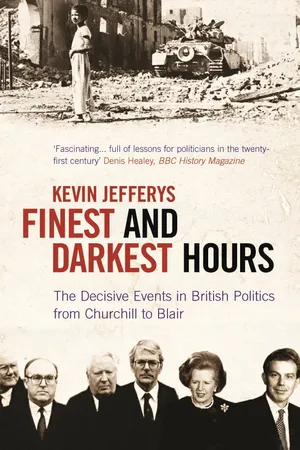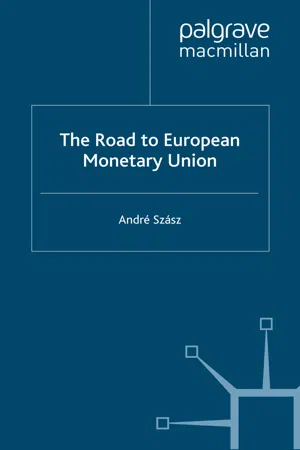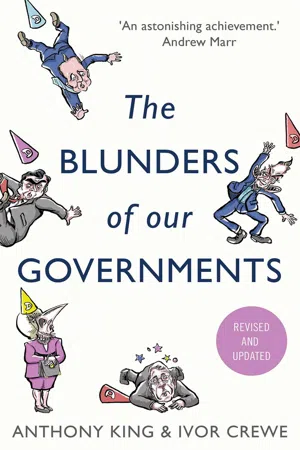Economics
Black Wednesday
Black Wednesday refers to September 16, 1992, when the British government was forced to withdraw the pound sterling from the European Exchange Rate Mechanism (ERM) due to speculative attacks on the currency. This event led to a sharp devaluation of the pound and significant economic repercussions, including a loss of confidence in the government's economic policies.
Written by Perlego with AI-assistance
Related key terms
1 of 5
5 Key excerpts on "Black Wednesday"
- eBook - ePub
- John Major(Author)
- 2013(Publication Date)
- HarperCollins(Publisher)
CHAPTER FOURTEEN Black WednesdayB LACK WEDNESDAY – 16 September 1992, the day the pound toppled out of the ERM – was a political and economic calamity. It unleashed havoc in the Conservative Party and it changed the political landscape of Britain. On that day, a fifth consecutive Conservative election victory, which always looked unlikely unless the opposition were to self-destruct, became remote, if not impossible.I was the chancellor of the exchequer who took sterling into the Exchange Rate Mechanism, and I was the prime minister when we were forced to leave it. It is right for me to accept responsibility for what happened, and I do so. But the political disaster of our exit was not the result of a simple miscalculation of the rate at which we entered. Ideologues so often reason as though random events have some kind of structural inevitability. This is not my experience. The rigidities of the Exchange Rate Mechanism were certainly bound to cause frictions, subterranean pressures and tremors, but there was no inevitability about the earthquake. It was precipitated by a combination – to a degree haphazard – of circumstances. I think we did perhaps underestimate the risk of a seismic seizure when we took sterling into the ERM, but I do not think we overlooked a certainty.Sometimes in politics the choice is between bad and awful. It was so in June 1992. That month, the Treasury forecast that the trade deficit would widen, government borrowing would grow and unemployment would continue to rise; we were in for a long haul. My hopes of a growing economy to bring about a gentler Conservatism were gone. Instead, to correct the economy, we would have to take decisions that were bound to hurt those I most wished to help.Still, I think we could have overcome this had we not been sideswiped from an unexpected direction. On 2 June I was attending a dinner at the Carlton Club when a message was brought to me with the result of the referendum in Denmark on whether or not to adopt the Maastricht Treaty on European Union: unexpectedly, the Danes had said no. - eBook - ePub
- Felix Berenskoetter, M. J. Williams, Felix Berenskoetter, M. J. Williams(Authors)
- 2007(Publication Date)
- Routledge(Publisher)
8 Contested credibility
The use of symbolic power in British exchange-rate politics
Wolf Hassdorf‘Black Wednesday’, 16 September 1992, the day when sterling was humiliatingly ejected from the European Exchange Rate Mechanism (ERM), remains a key date in the economic history not just of Britain and the European Monetary System (EMS), but of the post-war international monetary order. The collapse of the British exchange-rate peg was part of the wider currency crisis of the ERM in 1992/3; the type of financial crisis that would become a feature of the liberalised intentional financial system of the 1990s. At first glance, the crisis seems to confirm that with the liberalisation of international capital flows a qualitative shift of power from the nation-state to globalising financial markets had taken place. After all, the policy of the British Government to peg sterling to the Deutschmark, the anchor currency of the ERM, without backing up this policy by strictly following disinflationary German interest rates, was ultimately overpowered by speculative global finance. The outcome of the crisis confirmed that under conditions of full international capital mobility, an exchange-rate peg would, de facto, result in the surrender of monetary policy autonomy to the key currency country.1Intuitively attractive as such an interpretation of the disastrous outcome of Britain’s ERM membership may be, it overlooks the significance of the process that led to this outcome. The economic and political fragility of the sterling peg was evident from the moment sterling entered the ERM in 1990. However, it took financial markets until late August 1992 – less than four weeks before Black Wednesday – to fully realise that the peg lacked substance.2 The authorities impressed markets up to this point by tough rhetoric about the strength of the pound and by persistently voicing the commitment to do whatever it would take to defend parity. An internal document by the UK Treasury describes this as the Government hoping to maintain the exchange rate by ‘words’. As the treasury official put it, the authorities ‘duped’ or ‘tricked’ the market into believing that there was only a small risk that sterling would be devalued.3 It is this policy to compel belief in a strategy ultimately to be recognised as lacking substance which evokes images of the ‘emperor without clothes’ tale. Helen Thompson describes the hard currency rhetoric of Prime Minister John Major and Norman Lamont, his Chancellor of the Exchequer, as ‘bravura in the face of the foreign exchange market’ (Thompson 1996: 191). Given that it was bravura without substance, I prefer to call it ‘currency machismo’.4 - eBook - ePub
- Kevin Jefferys(Author)
- 2015(Publication Date)
- Atlantic Books(Publisher)
11 ‘. . . an extremely difficult and turbulent day’ Black Wednesday, 1992At least the nation can comfort itself that it was only money that was poured away, not blood. National pride has too often been paid for with the lives of young men in war. Nonetheless Mr Major’s quixotic battle with the speculators still seems the economic equivalent of the Charge of the Light Brigade: half a billion, half a billion, half a billion onwards . . .The Times, 19 September 1992It was at that moment we lost the 1997 election . . .There was never any real hope after that.John Major, reflecting on Black Wednesday, quoted in Robin Oakley, Inside Track (2001)T he weakness of the contemporary Conservative Party, humiliated in the general elections of 1997 and 2001, can be traced back to a single day almost a decade ago. On what swiftly became known as ‘Black Wednesday’, 16 September 1992, John Major’s government was confronted by a financial crisis from which it never recovered. For all those involved the overwhelming emotions, as interest rates swung up and down and as sterling faced devaluation, were those of disbelief, impotence and a terrible sense of failure. Britain had, of course, experienced similar situations before, but none had engulfed a government with such startling speed, and most had been associated with Labour administrations. After earlier devaluations of the pound, Labour had narrowly managed to secure re-election in 1950, and recovered some lost ground prior to defeat in 1970. But after September 1992, the Tories never looked remotely capable of winning a fifth successive term of office. The Conservative reputation for sound management, whether justified or not, was destroyed at a stroke, and the party plunged to the modest level of public support at which it has remained stuck ever since. Black Wednesday, in short, stands out as the single most debilitating event in Tory politics since the war. Its impact was more devastating to the party’s electoral fortunes than any of the earlier crises it had confronted – Suez, Profumo, the three-day week and the downfall of Thatcher among them. In order to understand why this was so, we need to appreciate the particular circumstances of 1992, especially what the distinguished financial writer Philip Stephens calls the lethal combination and crossover between ‘the economics of the pound and the politics of Europe’.1 - eBook - PDF
- André Szász(Author)
- 2000(Publication Date)
- Palgrave Macmillan(Publisher)
The French authorities, after an unfortunate initial hesitation, at last raised interest rates. The Bundesbank sup- ported the franc at levels they would never have been prepared to put at its disposal in advance, in the form of 'mechanisms' the French, the Italians and the Commission had so often demanded in the past. French Finance Minister Sapin put German support at French franc 160 billionY The Dutch also helped. Narrowly, the attack was endured. The ERM, though badly damaged, survived. 19.4 AFTERMATH For the British government, and for the ruling Conservative Party, Black Wednesday turned out to be a traumatic experience com- parable to what Harold Wilson's Labour government experienced following the pound's devaluation in November 1967. In both cases, the event was seen as a major defeat over an issue that deeply split the governing party. What would make Black Wednesday worse was the fact that Europe remained prominently on the political agenda. Governor Leigh-Pemberton, looking back at the crisis, stated in October 1992: 'It is my view that the decision to join the ERM in Black September 181 October 1990 was right in the circumstances; that having joined, we were right to endeavour to stick with it; and that, in the circumstances which evolved, we were also right to withdraw.m As to the level of the exchange rate he said such evidence as has been advanced in support of the assertion that sterling entered the ERM at too high an exchange rate is far from conclusivc. 24 ••• Our problem arose because the degree of divergence between the domestic policy needs of Germany on the one hand and those of much of the rest of Europe on the other became wholly abnormal, and it was this quite abnormal tension that tested the margin of tolerance built into the ERM to destruction. - eBook - ePub
- Anthony King, Ivor Crewe(Authors)
- 2014(Publication Date)
- Oneworld Publications(Publisher)
It was the understatement of the century.In the event, withdrawing from the ERM did the British economy no harm and almost certainly did it good. The country emerged gradually from recession, inflation and interest rates both fell and towards the end of the decade the pound was trading, ironically, at about its original ERM parity with the Deutschmark. But the events just prior to Black Wednesday and then on the day itself cost British taxpayers at least £3.3 billion and possibly more, and the whole episode was undoubtedly a catastrophe for the prime minister, whose reputation never recovered. It was also a catastrophe for the chancellor, who was ignominiously ousted from office a few months later, and for the Conservative party, which lost its reputation for economic competence and whose chances of being returned to office for a fifth consecutive term in a few years’ time all but vanished. One of the most striking features of the day is that, despite sterling’s travails over many months and years beforehand, few in the higher reaches of the British government, if any, appear to have done any serious contingency thinking, let alone contingency planning. On the day, it all just happened.Passage contains an image
8
“Cool Britannia”
So far we have dealt with blunders all of which resulted from government initiatives intended to strengthen the public finances, improve Britain’s economic prospects or improve the lot of the less well off. The New Millennium Experience – known for short at the time simply as “the Dome” – was the principal manifestation of New Labour’s post-1997 “Cool Britannia” project, and it falls into a totally different category. It had little or nothing to do with the welfare of the British people. Its purposes were to entertain, impress and possibly educate those who chose to experience the Experience but also, even more, to enhance the New Labour government’s standing at home and the UK’s prestige abroad. It failed on almost all counts. Unlike the postwar Festival of Britain, it failed to attract anything like the expected number of visitors and it lost a great deal of money. It also embarrassed ministers and made Tony Blair’s newly elected government look foolish. It was an undoubted blunder –
Index pages curate the most relevant extracts from our library of academic textbooks. They’ve been created using an in-house natural language model (NLM), each adding context and meaning to key research topics.
